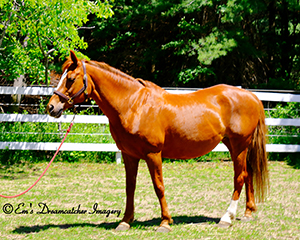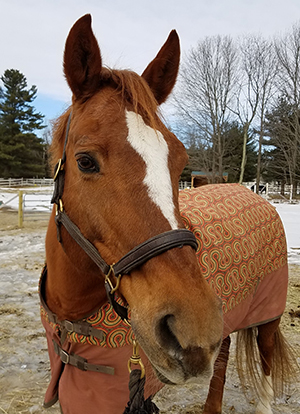The state of Maine might not be known for producing elite sport horses, but should you visit most any stable there and mention the name "Paxton Abbey", you will receive a knowing look and a smile. Perhaps one of the most famous equine athletes to call the state her lifelong home, Paxton (or just plain "Pax" to her close friends) enjoyed a storied career in both eventing and para dressage with her owner/breeder, Mary Jordan. But perhaps her most significant role has been as a healer, first at Carlisle Academy in Lyman, Maine, and since 2017, Riding To The Top Therapeutic Riding Center (RTT) in Windham, Maine.
"Paxton is legendary--everybody knows Paxton!" says Kate Jeton, program director at RTT. "She's quite a horse."
A homebred, Paxton is out of Jordan's event horse, Nut Brown Ale, and by the Hanoverian Pray for Snow. She made her show ring debut at just 3 months old, besting imported warmbloods to win the title of Reserve Best Young Horse at the New England Dressage Association Breed Show. Jordan developed Paxton for the sport of eventing herself, ultimately competing at the American Eventing Championships annually during 2005-2007 and earning the 2007 US Eventing Association Training Level Horse of the Year title. The pair competed through preliminary level--a lifelong goal for Jordan--before retiring from the sport.
In 2002, Jordan was diagnosed with multiple sclerosis, and suffered several serious physical setbacks during Paxton's eventing career. Unwilling to give up on her equestrian goals, in 2010, Jordan became classified as a Grade IV para dressage rider, and her training with Paxton took on a new focus. The pair competed on the U.S. para dressage team at the 2010 World Equestrian Games in Lexington, Kentucky, just months after debuting in the sport.
Throughout Paxton's competitive career, but particularly as Jordan's physical health became challenging, she relied on her homebred's kind, willing and steady temperament to help keep her safe. When it came time for the mare to step down in her workload, Paxton brought those same qualities to her new role as a therapy horse.
"She makes this connection with people," explains Jeton. "She just gives and gives and gives."
Almost immediately upon arriving at RTT, Paxton proved to be a natural fit for their programming.
"We have riders of so many different abilities get on her," says Jeton. "She knows who is on her back."
Although Paxton is only about 15.2 hands, her dam's Percheron/Morgan/Thoroughbred genetics instilled her with breadth and bone. For some clients, Paxton seems larger than life, yet when they have the opportunity to ride her, they find a sensitive and responsive partner.
"She instills confidence, whether her rider is a little beginner, or somebody who's been riding for a number of years," says Jeton.
It is nearly impossible for RTT staff to quantify the impact Paxton has had on their clients. For one young man with autism, Paxton was the mount who showed him he could ride independently. For a woman living with MS like Jordan, Paxton has been both a confidant and a source of hope, helping her to focus on what she can do rather than what she can't. For several children with complex mental health issues, Paxton has become the mount they connect with most deeply.
"Throughout her career, Paxton has risen to every challenge, be it on the national or international stage of competition, or in serving clients with significant physical and cognitive challenges," says Sarah Bronson, RTT executive director. "Some horses need their humans to help them stay organized, while other horses are pros at keeping their humans organized. Paxton is definitely the latter!
"She gives her all to everyone who comes in contact with her at RTT--our clients, our volunteers and our staff," continues Bronson. "She is indeed a very special horse, who has changed hundreds of lives."

